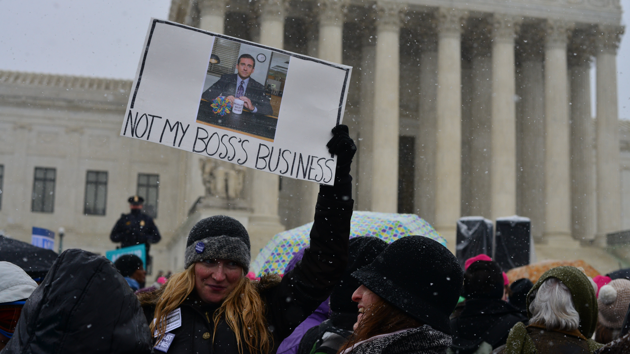
dbdurden/Thinkstock
A year after its controversial Supreme Court victory, Hobby Lobby found itself on the other side of a court decision—this time for denying a transgender employee access to the women’s restroom.
Since she transitioned more than five years ago, frame shop manager Meggan Sommerville has been forced to either use the men’s restroom in her Illinois Hobby Lobby store or wait until her lunch break, when she could slip into other businesses nearby to use a women’s restroom. In a May decision made public for the first time on Sunday, a state administrative judge ruled that the chain’s treatment of Sommerville violates Illinois’ Human Rights Act, finding “direct evidence of sexual related identity discrimination” in the store’s decision to bar her from the women’s restroom until she had gender reassignment surgery.
The judge’s order was a recommended ruling; a final decision from the state’s Human Rights Commission is still pending. In the meantime, for Sommerville, nothing has changed: Hobby Lobby still requires her to use the men’s restroom.
Hobby Lobby hired Somerville in 1998, and two years later, she was transferred to the company’s location in east Aurora, Illinois. By 2010, she was presenting and identifying as female and had legally changed her name to Meggan Renee. When she formally approached her employer to notify them of the transition, the company altered her personnel file to reflect the change, and Sommverville changed her nametag. Yet the company denied her request to use the women’s restroom, demanding that she provide documents that would compel them to do so. Still, even after Sommerville did so, Hobby Lobby continued to deny her request, going so far as to issue her a written warning for using the women’s restroom in February 2011. The company later insisted that she undergo gender reassignment surgery, which would allow her to change her birth certificate, before she could use the women’s bathroom in the store.
Sommerville filed a complaint, but it was dismissed by the Illinois Department of Human Rights in 2012 for lack of evidence, a decision that was later overturned.
Sommerville’s bosses instructed her not to use the restroom in part because another employee expressed “discomfort,” the ruling revealed. “A co-worker’s discomfort cannot justify discriminatory terms and conditions of employment,” Judge William Borah wrote. “The prejudices of co-workers or customers are part of what the Act was meant to prevent.” Furthermore, Borah found that Hobby Lobby’s decision to build a unisex restroom for Sommerville’s use was an example of segregation and “perpetuates different treatment.”
“Do I want to continue doing what I do? Yes,” Sommerville told the Windy City Times. “I enjoy it. Why should I quit? I’m good at what I do. I love what I do. If I quit, I give a right to any other company to discriminate against their employee in the hopes that they will quit so they will be done with them. No one should be forced to quit where they’re being harassed and discriminated against. This case is bigger than me.”
















